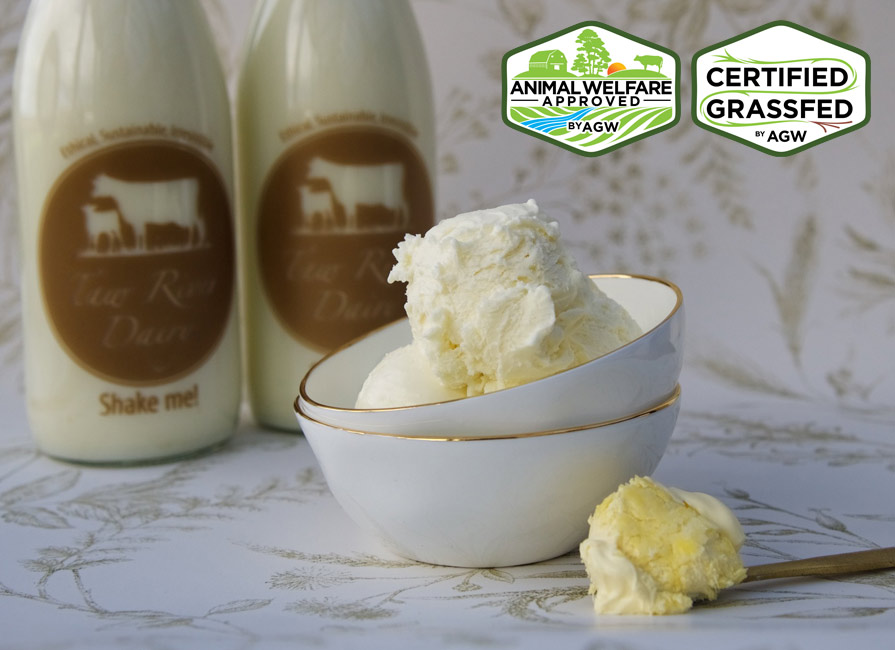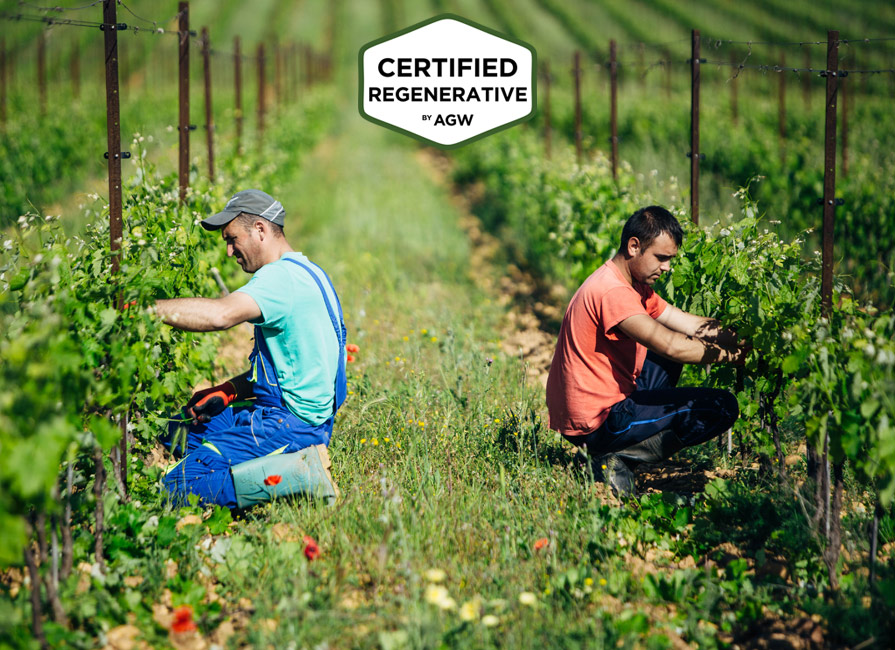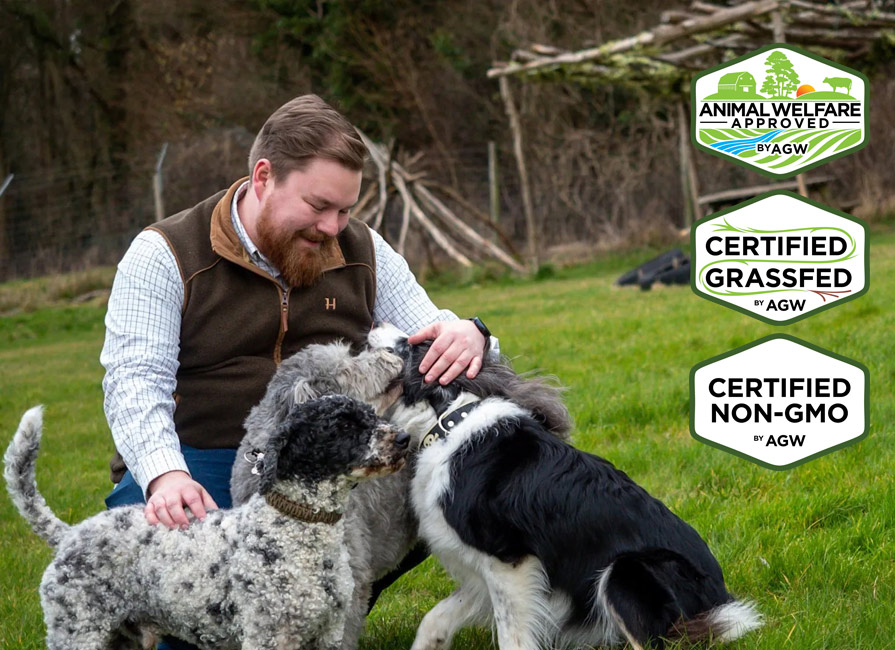Famille Gassier is one of the premier vineyards the southern Rhône Valley in the south…

Taw River Dairy, Sampford Courtenay, Devon
Sam and Gemma Bullingham raise Certified Animal Welfare Approved by AGW and Certified Grassfed by AGW dairy cows and Certified Animal Welfare Approved by AGW beef cattle in Devon, pasteurising and bottling fresh milk and producing delicious ice cream on site, sold under the Taw River Dairy brand.
Sam established the business in early 2017 with just 10 dairy cows on around 40 acres. Today, the couple manage a herd of 70 pure-bred and Jersey cross cows on pasture, producing around 2,500 litres of milk a week, as well as a small herd of Belted Galloway beef cattle, Exmoor Horn sheep, and Dartmoor ponies for conservation grazing.
“My grandparents were farmers and since I was about eight, I have always kept a few sheep,” Sam says. “It’s been a long journey in farming for someone not directly from a farming family!” When he was 18, Sam took on a farm business tenancy, initially raising sheep to supply his local lamb meat box business, alongside sheep shearing and other work. After contract rearing heifer cows for a local dairy farm, he then began working at the farm, helping them to convert to organic. “That’s where the idea for Taw River Dairy began to take shape,” he explains.
“While I was working at the dairy farm, I happened to go along to a dairy farm show and got chatting to an ice-cream processing equipment supplier. We started talking about the market opportunities for local ice cream production and the equipment involved, and that I only really needed a small number of cows to start.” Sam bought 10 cows from the farm he was working with and established Taw River Dairy in early 2017. By May, he was processing his first Taw River Dairy ice cream and fresh milk.
“It was all a bit of a leap of faith,” Sam says. “But despite not having much experience, it all went surprisingly well. As well as making a small quantity of ice cream, I started to sell liquid milk in glass bottles. With growing public concern about waste plastic fuelled by documentaries like Sir David Attenborough’s The Blue Planet, the timing really couldn’t have been better.”
Demand increased exponentially and Sam began to grow the herd to keep up with demand. “We now have about 70 milking cows that we milk once a day, producing around 2,500 a week.” All milk is processed on site three times a week and sold locally as either bottled fresh milk or ice cream. “The milk is out of a cow and into a shop within two days. You can’t get fresher than that!” Sam adds.
The bottled milk and ice cream is delivered by electric van to numerous shops and other retail outlets in Tavistock, Exeter, Okehampton, Tiverton, Chagford, Mortenhampsted and beyond. “We also sell bottled milk through well-known online retailer Pipers Farm, who we’ve been supplying for over two and a half years,” Sam adds. They also take their Taw River Dairy ice cream to numerous local events and fairs.
Despite being relatively small, Sam has arguably been a pioneer when it comes to high welfare, sustainable dairy farming. For example, he was one of the first dairy farms in the UK to keep calves with their mothers, raise dairy cows on a 100% grassfed diet, and milk year-round. “We milk the cows once a day and let calves with the mother cows for three or four months, by which time they are fully grazing. We’re still one of only a handful dairies in the UK to manage and milk cows like this because we believe it gives the calves a far better start. You can really see the health differences in a calf reared by its mother. It’s also a big plus for many of our customers who really care how we manage our animals.”
The farm uses holistic grazing practices, which help to build soil health and improve the soil structure. The cows graze species-rich pastures, comprising unusual grasses, legumes and herbs, such as bird’s foot trefoil, clovers, vetch, plantain and chicory. “This mixture of deep-rooting plants draws up minerals from the soil and provides the cows with a highly palatable and nutritious natural forage diet,” Sam explains. “But species-rich pastures are also far more resistant to drought conditions because they can tap into water sources deeper within the soil. Last summer when many conventionally managed fields around us were parched and brown, we still had some decent grazing. This will become increasingly important as climate change bites.” Research also shows that this type of low intensity grazing management can ‘capture’ significant amounts of atmospheric carbon in the soil through a process known as carbon sequestration. Indeed, Sam believes the farm now sequesters more carbon in the soil than it emits.
Sam and Gemma selectively breed their cows for this more natural approach. “Use a lot of our own progeny and breed for animals that suit our grassfed system,” they explain. “We’re producing replacement cows that are healthier, more robust and milkier and better suited to our local environment, the soil and forages we grow, and the local disease challenges we face.” They are also selecting cows to produce ‘A2 milk’, a variety of cows’ milk that lacks a certain form of beta-casein proteins. Recent studies suggest that people with lactose intolerance experience significantly fewer symptoms from consuming A2 milk versus regular milk. “We’ve had the whole herd tested and almost all of our Jersey cows produce A2 milk proteins, meaning even those who are milk or dairy intolerant can enjoy Taw River Dairy milk and ice cream.”
The benefits of the farm’s positive management approach are ultimately passed on to customers through the quality of the milk and ice cream produced. “It’s quite simple: happy, healthy cows produce higher quality, better tasting milk,” says Sam. “We graze the cows on species-rich pasture for as much of the year as possible, which means our milk not only tastes great but contains higher levels of omega 3, vitamin E, antioxidants and other health-giving properties than conventional milk.”
Sam and Gemma are passionate about educating the public about where their food comes from and how it is produced and regularly host walks and events at the farm. “It is possible to farm alongside nature, producing high quality food while giving nature space to thrive, integrating networks of hedgerows and providing specific natural habitats for wildlife,” adds Sam. “With all the recent negative media coverage about farming’s environmental impact, it’s important our customers know that there is another way.” Along with six other farms, Sam and Gemma started the Devon Silvopasture Network to incorporate clusters of native trees and shrub species on around 10 acres of pasture to provide shelter, shade, and ‘browse’ for their livestock, as well as additional habitat for wildlife. “Given the opportunity, cows and other farmed animals will eat leaves from certain tree species to selectively self-medicate, reducing the need for medical interventions,” he adds. “It’s a fascinating area of emerging research to be involved in.”
As if that wasn’t enough, work is underway to upgrade the on-farm honesty shop to sell not only more bottled milk, ice cream and beef, but also locally grown fruit, vegetables, and other produce from local suppliers.
Taw River Dairy’s Certified Animal Welfare Approved and Certified Grassfed by AGW fresh bottled milk, ice cream and Certified Animal Welfare Approved by AGW beef is available directly from the on-site farm shop near Sampford Courtenay, as well as at shops and other outlets across Devon and online retailers for national delivery. Check the AGW directory for details. For more information about Taw River Dairy, follow the farm on Facebook or contact Sam at 07525 164805 or email info@tawriverdairy.co.uk.



